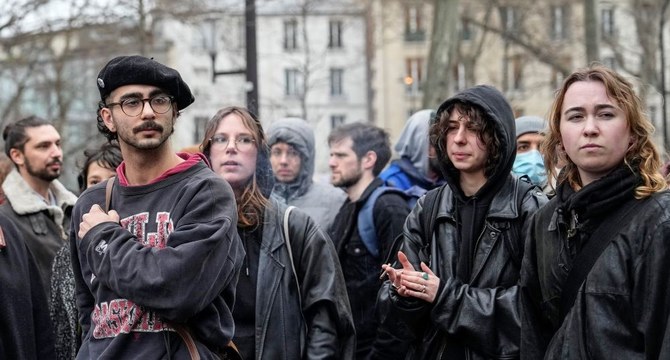
It is not that difficult to irritate the French public, especially when any government or president tries to encroach on their lifestyle, their hours of work (only 35 hours per week) or their retirement age and, by default, their pension. President Emmanuel Macron’s decision to proceed with his plan to raise the retirement age by two years has inflamed French emotions on the left and the right and, as usual, translated into strikes and even violent protests on the streets of various French cities, including Paris.
Anger over Macron’s decision to invoke a notorious constitutional power to ram the reform through parliament without a vote dismayed the opponents of the president and his government, which has a slim majority. It also further lowered the approval rating of Macron to 28 percent, the lowest it has been for four years, and for which Macron might pay dearly.
Since socialist President Francois Mitterrand brought the retirement age down to 60 years from 65 in 1982, most French presidents have tried but failed to increase it again. This issue featured on all the reform plans of successive right and left-leaning governments. Alain Juppe’s government under President Jacques Chirac abandoned its plans to raise the retirement age for public sector workers in 1995 after mass demonstrations, unseen in France since 1968, spread across the country.
Center-right President Nicolas Sarkozy managed in 2010 to raise the retirement age to 62, despite protests that saw millions of French take to the streets. He even made access to the full state pension only available to those who have worked for more than 41 years. In 2014, despite protest rallies, socialist President Francois Hollande enacted a reform that will increase the number of years of work needed to earn a full pension to 43 by 2035.
Macron’s attempt to push through pension reforms in his first term was shelved due to widespread protests and then the COVID-19 pandemic. In his second and final term in office, perhaps this is Macron’s last chance to fulfill his election manifesto promise.
Though more than half the French people believe that their generous pension and early retirement privileges are no longer sustainable, public sector workers, who have the most to lose, were the quickest to respond as, under the proposed changes, new entrants will not be eligible for the special pension regime enjoyed by their predecessors. But the France of today is not the France of yesteryear. The government has said that the reforms are needed to balance the public finances and that they will offer a gross saving of more than €17 billion ($18.3 billion) a year by 2030.
With the changing nature of the labor market, new technologies and better health leading to longer life expectancies, the social security systems in many nations could buckle in the coming years. Macron is attempting to balance the state’s support of the country’s workforce, allowing a decent retirement income for those who have contributed for decades, with paying for a larger-than-usual number of unemployed working-age citizens due to a shrinking and changing work economy.
In the middle of a cost-of-living crisis — and despite the importance of his proposed urgent reforms — Macron has so far failed to wipe out the impression among French people that he is an “aloof” character and out of touch with the majority. In the minds of many French, their president, who was voted in for a second term only to prevent the far right from breaking through to the presidency, remains an elitist banker and his government is not to be trusted to be fair and effective in its implementation of reforms.
Macron has so far failed to wipe out the impression among French people that he is an ‘aloof’ character and out of touch with the majority.
Mohamed Chebaro
Many in France are also led to believe that the government has not reached out to various industrial and trade union organizations to find the necessary consensus for the proposed pension reforms, which are seen by the government as critical to avoiding crippling deficits in the coming years due to France’s aging population. The other side of the coin is that the retirement and pension age reforms would place an unfair burden on those with lower incomes, women, and people doing manual and physically intensive jobs.
All indicators are that a stalemate is in the pipeline for Macron’s leadership, despite the slim survival of the government during two no-confidence votes this week and despite Macron’s assurances that his policies are in the interests of France’s long-term prosperity and social stability.
Amid the continuing geopolitical challenges being felt across the Western world due to the Russian invasion of Ukraine, maybe the last thing that France, Europe and the West wants to see is a key capital being distracted by another bout of violent anti-government protests on the scale and geographical spread of the “Yellow Vest” movement that shook the country in 2018 and 2019.
Mohamed Chebaro is a British-Lebanese journalist, media consultant and trainer with more than 25 years of experience covering war, terrorism, defense, current affairs and diplomacy.












